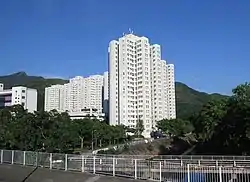Chevalier Garden
Chevalier Garden (Chinese: 富安花園) is a Home Ownership Scheme and Private Sector Participation Scheme court in Tai Shui Hang, Ma On Shan, New Territories, Hong Kong near MTR Tai Shui Hang station.[3] It was jointly developed by the Hong Kong Housing Authority and Chevalier Group, and it was the first HOS court developed by Chevalier Group.[4] It has a total of seventeen blocks built between 1987 and 1988.
| Chevalier Garden | |
|---|---|
 Chevalier Garden | |
| General information | |
| Location | 2 Hang Shun Street, Ma On Shan New Territories, Hong Kong |
| Coordinates | 22.40462°N 114.22385°E |
| Status | Completed |
| Category | Home Ownership Scheme |
| Population | 11,064[1] (2016) |
| No. of blocks | 17[2] |
| No. of units | 3,942[2] |
| Construction | |
| Constructed | 1987 |
| Contractors | Chevalier Group |
| Authority | Hong Kong Housing Authority |
Background
Chevalier Garden is the first public housing estate in Hong Kong to be built by the Chevalier Group. Later, Chevalier Group had built several public housing estates in Hong Kong, such as Beverly Garden in Tseung Kwan O, Charming Garden in Mong Kok, Cheerful Garden, Fullview Garden and Harmony Garden in Siu Sai Wan, Elegance Garden in Tai Po, Glorious Garden in Tuen Mun, Grandway Garden in Tai Wai and Saddle Ridge Garden in Ma On Shan.[5]
Houses
| Name[2] | Chinese name | Building type | Completed |
|---|---|---|---|
| Block 1 | 第1座 | Private Sector Participation Scheme | 1987 |
| Block 2 | 第2座 | ||
| Block 3 | 第3座 | ||
| Block 4 | 第4座 | ||
| Block 5 | 第5座 | ||
| Block 6 | 第6座 | ||
| Block 7 | 第7座 | ||
| Block 8 | 第8座 | ||
| Block 9 | 第9座 | ||
| Block 10 | 第10座 | ||
| Block 11 | 第11座 | 1988 | |
| Block 12 | 第12座 | ||
| Block 13 | 第13座 | ||
| Block 14 | 第14座 | ||
| Block 15 | 第15座 | ||
| Block 16 | 第16座 | ||
| Block 17 | 第17座 |
Demographics
According to the 2016 by-census, Chevalier Garden had a population of 11,064. The median age was 50.1 and the majority of residents (95.7 per cent) were of Chinese ethnicity. The average household size was 3 people. The median monthly household income of all households (i.e. including both economically active and inactive households) was HK$36,670.[1]
Politics
Chevalier Garden is located in Tai Shui Hang constituency of the Sha Tin District Council.[6] It was formerly represented by Michael Yung Ming-chau, who was elected in the 2019 elections until July 2021.[7]
See also
References
- "Major Housing Estates". 2016 Population By-census. Census and Statistics Department. Retrieved 15 July 2021.
- "Housing Authority Property Location and Profile | Hong Kong Housing Authority and Housing Department | Hong Kong Housing Authority and Housing Department". Hong Kong Housing Authority. Retrieved 15 July 2021.
- "Tai Shui Hang Station street map" (PDF). MTR Corporation. Retrieved 15 July 2021.
- "Milestones". Chevalier International Holdings Ltd. Retrieved 15 July 2021.
- "Property Management". Chevalier International Holdings Ltd. Retrieved 15 July 2021.
- "Recommended District Council Constituency Areas (Sha Tin District)" (PDF). Electoral Affairs Commission. Retrieved 15 July 2021.
- "Sha Tin District Council - Sha Tin DC Members". District Council. Retrieved 15 July 2021.